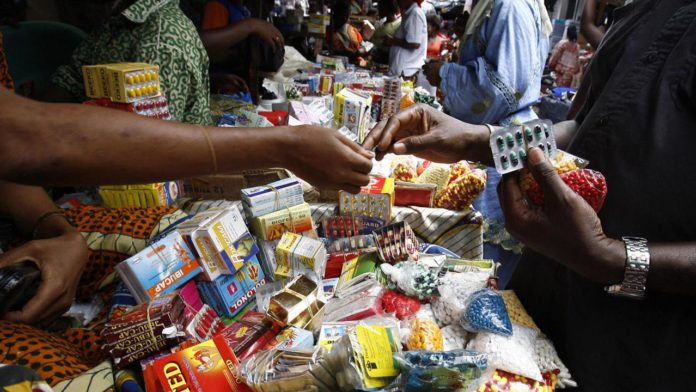The arrested businessman has been arraigned before a Federal High Court on four counts of unlawful importation, possession, sale, and distribution of fake Amanta Forte soft gel (Artemether 80mg + Lumefantrine 480mg Capsules) drug at Head bridge market Onitsha, Anambra State.
According to a report by Vanguard, the National Agency for Food and Drug Administration and Control, NAFDAC, on Monday arrested a 32-year-old businessman identified as Obinna Igbo.
He was arrested over importation and sale of fake Amanta Forte, an unregistered anti-malarial drug.
The arrested businessman has been arraigned before a Federal High Court on four counts of unlawful importation, possession, sale, and distribution of fake Amanta Forte soft gel (Artemether 80mg + Lumefantrine 480mg Capsules) drug at Head bridge market Onitsha, Anambra State.
A press statement issued by NAFDAC, in Lagos on Monday, revealed that the defendant sold the fake drugs at Shop E200, Freedom Line, Onitsha Head Bridge Market after importing the same into the country.
READ ALSO: Timothy Adegoke’s Death Not Anatomically Determined – Pathologist
Upon intelligence, the Director-General of NAFDAC, Prof. Mojisola Adeyeye disclosed that officials of the Investigation and Enforcement Directorate of the Agency had raided three pharmaceutical outlets at Head bridge market Onitsha; namely Triphon Point Global limited, Emma Medicals Nigeria Limited, and Ekeh Mountain Global Ventures Limited.
According to the Adeyeye, offending product was found in Triphon Point Global limited, and the product was subsequently evacuated while the shop was placed on hold.
She explained further that at Emma Medicals and Ekeh Mountain Global Ventures Limited, the shops were visited, and thorough screening was conducted.
Adeyeye further added that the offending product was not found being displayed on their shelves, but their sales books revealed that the product was sold by them.
The NAFDAC boss said that the three shops were placed on hold while the managing directors were invited for further interrogation.
She explained that the three suspects were interrogated independently and their statements extracted, adding that they claimed that they sourced the product from one Blessed OJ Don Global Link in the market. According to the NAFDAC DG, the three suspects further stated that if given the opportunity they would assist the Agency in apprehending Mr Obinna Igbo. (MD, Blessed OJ Don Global Link)
Adeyeye explained that all efforts to arrest Mr Igbo proved abortive as he was on the run knowing that he was being trailed by NAFDAC. She further disclosed that a tracking device was engaged to track him down in Onitsha where he was eventually arrested and taken into custody by the Investigation and Enforcement officers of NAFDAC in Asaba before he was transferred to the I&E Lagos office.
READ ALSO: NAFDAC Intercept Dangerous Imported Ponmo
Upon interrogation, Adeyeye said Igbo acknowledged that he was the importer of Amanta Forte Soft Gel an illegal antimalarial drug he smuggled into Nigeria from Ghana. Although the date markings on the products indicated that the product was manufactured in India and marketed by Mitzaagold International FZE Amin Hussain market, AL Trade Zone, Dubai, UAE.
He, however, said he has other pharmaceutical products which he also imported into the country, some of which are anti-hypertensive drugs. In his statement, he acknowledged that he sold the product to the shops visited during the raid by NAFDAC.
Igbo, however, pleaded not guilty before Justice Tijani Ringim. Although defence counsel, Mr. A.C. Oforjiuba, sought to make an oral bail application for Igbo, prosecuting counsel, Chinyere Okoli, prayed the court to remand him in custody pending trial.
The judge, however, ordered that he should be kept in a correctional facility pending a formal bail application. He adjourned the case until June 6 for trial.
According to the agency, the offences contravened the provisions of Section 1(a) of the Counterfeit and Fake Drugs and Unwholesome Processed Foods (Miscellaneous Provisions) Act of 2004. They also contravened the provisions of Sections 1(1) of the Food, Drugs and Related Products Registration Act.

